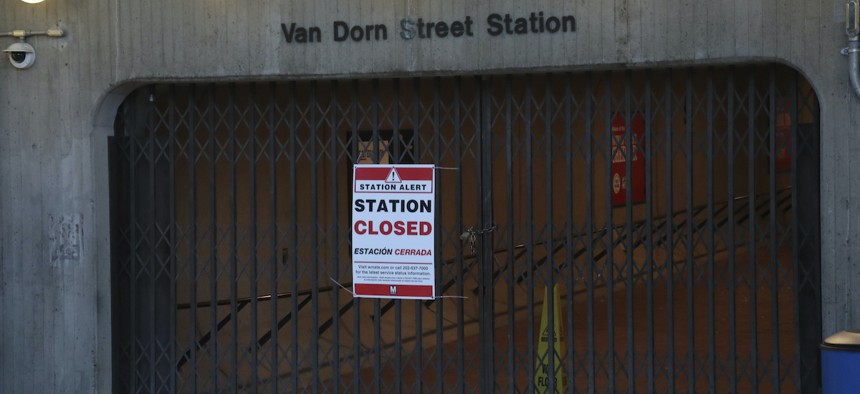D.C.'s Transit System Won't Fully Restart Service Until Next Spring

The Washington Metropolitan Area Transit Authority closed 19 stations in the Metro DC area to preserve cleaning supplies amid a 95 percent decrease in ridership during the Covid-19 pandemic. Associated Press
A phased recovery plan for the Metro system in the Washington, D.C. area doesn't envision a quick return to normal levels of service. Across the country, transit agencies are figuring out how to balance safety and service.
The coronavirus recovery plan for Washington D.C.’s public transit system doesn’t project a return to normal levels of service until next spring, the Washington Metropolitan Area Transit Authority said this week. But the system’s ability to reopen depends largely on outside factors, including the development of an effective treatment or vaccine for Covid-19.
“Metro’s plan is closely aligned with steps planned by local governments and employers, including the federal government. Its success depends on a sustained downward trajectory in infections and a gradual ramp-up in service and ridership,” WMATA said in a statement. “The phases of the plan coincide with the relaxing of stay-at-home policies, return to workplaces, and the widespread availability of testing, treatment and a vaccine, among other variables.”
As states and cities across the country begin preparing to reopen, transit agencies are grappling with how to craft recovery plans that hinge on outside factors largely beyond their control. And even the known factors are difficult to plan for. Social distancing, for example, will continue to be necessary even as ridership begins to increase, and accommodating spaced-out passengers on rail cars and buses may be difficult for transit agencies to accommodate with a diminished workforce. In Boston, for example, transit officials are slowly ramping up service in anticipation of increased demand, but ensuring adequate numbers of vehicles is difficult because hundreds of workers are on Covid-19 related leave.
"This is going to be a slower ramp-up than I think anybody expected, even a few weeks ago," Paul Skoutelas, president and CEO of the American Public Transportation Association, told CNN. "As long as we remain in a shutdown mode or a partial mode, I think that ramp up will be rather slow."
D.C.’s Metro, the second-largest in the U.S. by ridership, began making service changes in March to halt the spread of the coronavirus. Officials reduced operating hours, closed 19 stations, asked riders to wear cloth face coverings and eliminated bus fares so that patrons could enter from the rear door, minimizing contact with drivers. The system’s planned reopening, broken into three phases and presented to transit authority board members Thursday, aims to prioritize “the health and safety of its customers and employees while providing transportation for essential trips throughout the region.”
That process will include internal monitoring of infection rates and ridership trends, as well as keeping tabs on restrictions lifted by local governments and employers, with the goal of ramping up service “ahead of demand to allow for adequate social distancing” with the appropriate number of trains and buses.
But those trends hinge on multiple factors, including the restoration of the medical supply chain, the difference in virus impacts among different communities and the development and deployment of a reliable vaccine, the plan says. For example, according to Metro’s internal statistical models, infections and hospitalizations within the region could peak anywhere between the end of May and July.
“Restoration timing depends on all of the above, none of which is WMATA’s control,” the plan says. “But we have to predict when it will happen in order to be ready with appropriate service.”
Reduced service hours are likely for the rest of the year, and Metro has said it plans to reach out to both federal and private employers in the area to ask for help in keeping ridership low, including implementing flexible work schedules and allowing telework to continue. The authority also hopes to limit the number of riders on buses and trains to more easily allow for the recommended six feet of distance between passengers, with markers painted on platforms and in cars to help people stay apart.
“As conditions improve, jurisdictions are expected to relax stay-at-home policies and businesses will reopen, as will schools and childcare facilities. Accordingly, more customers are expected to commute to work or travel for other needs,” the plan says. “However, large-scale telework and persistent unemployment are expected in this phase, and discretionary activities including dining out and entertainment remain limited. Continued social distancing measures will be required due to ongoing transmission risk.”
The first phase of the plan is estimated to begin, “subject to regional developments,” this summer or fall. But “dates are only tentative,” the plan says. “Actual dates of serve change will be based on regional readiness, with two-month lead time.”
In the final, post-pandemic phase—likely next year at the earliest—the authority will assess its performance during the crisis and make adjustments “to make the system safer and more resilient to future pandemics.”
Kate Elizabeth Queram is a staff correspondent for Route Fifty and is based in Washington, D.C.
NEXT STORY: No quick fix for state legacy IT problems





